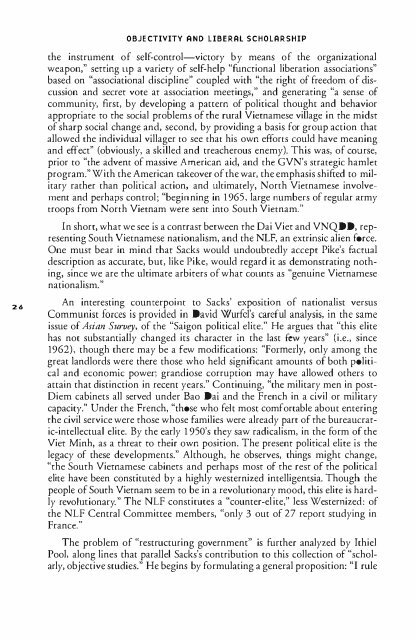Chomsky on Anarchism.pdf - Zine Library
Chomsky on Anarchism.pdf - Zine Library
Chomsky on Anarchism.pdf - Zine Library
Create successful ePaper yourself
Turn your PDF publications into a flip-book with our unique Google optimized e-Paper software.
OBJECTIVITY AND LIBERAL SCHOLARSHIP<br />
26<br />
the instrument of selfc<strong>on</strong>rrol-victory by means of the organizari<strong>on</strong>al<br />
weap<strong>on</strong>," setting lip a variety of self-help "functi<strong>on</strong>al liberati<strong>on</strong> associati<strong>on</strong>s"<br />
based <strong>on</strong> "associati<strong>on</strong>al discipline" coupled with "the right of freedom of discussi<strong>on</strong><br />
and secret vote at associati<strong>on</strong> meetings," and generating "a sense of<br />
community, first, by developing a pattern of political thought and behavior<br />
appropriate to the social problems of the fUral Vietnamese village in the midst<br />
of sharp social change and, sec<strong>on</strong>d, by providing a basis for group acti<strong>on</strong> that<br />
allowed the individual villager to see that his own efforts could have meaning<br />
and effed' (obviously, a skilled and treacherous enemy). This was, of course,<br />
prior to "the advent of massive American aid, and the GVN's strategic hamlet<br />
program." With the American takeover of the war, the emphasis shifted to military<br />
rather than political acti<strong>on</strong>, and ultimately, North Vietnamese involvemenr<br />
and perhaps c<strong>on</strong>nol; "beginning in 1965, large numbers of regular army<br />
troops from North Vietnam were senr inro South Vietnam."<br />
In short, what we see is a c<strong>on</strong>trast between the Dai Viet and VNQDD, represenring<br />
South Vietnamese nati<strong>on</strong>alism, and the NLF, an extrinsic alien force.<br />
One must bear in mind that Sacks would undoubtedly accept Pike's factual<br />
descripti<strong>on</strong> as accurate, bm, like Pike, would regard it as dem<strong>on</strong>strating nothing,<br />
since we are the ultimate arbiters of what COlints as "genuine Vietnamese<br />
nati<strong>on</strong>alism. "<br />
An inreresting counrerpoim to Sacks' expositi<strong>on</strong> of nari<strong>on</strong>alist versus<br />
Communist forccs is providcd in David Wurfcl's careful analysis, in the samc<br />
issue of Asian Survey, of the "Saig<strong>on</strong> political elite." He argues that "this elite<br />
has not substantially changed its character in the last few years" (i.e., since<br />
1962), though there may be a few modificati<strong>on</strong>s: "Formerly, <strong>on</strong>ly am<strong>on</strong>g the<br />
great landlords were there those who held significant amounts of both political<br />
and ec<strong>on</strong>omic power; grandiose corrupti<strong>on</strong> may have allowed others to<br />
attain that distincti<strong>on</strong> in recent years." C<strong>on</strong>tinuing, "the military men in pOSt<br />
Diem cabinets all served under Bao Dai and the French in a civil or military<br />
capacity." Under the French, "those who felt most comfortable about entering<br />
the civil service were those whose families were already part of the bureaucratic-intellectual<br />
elite. By the early 1950's they saw radicalism, in the fo rm of the<br />
Viet Minh, as a threat to their own positi<strong>on</strong>. The present political elite is the<br />
legacy of these developments." Although, he observes, things might change,<br />
"the South Vietnamese cabinets and perhaps most of the rest of the political<br />
elite have been c<strong>on</strong>stituted by a highly westernized intelligenrsia. Though the<br />
people of South Vietnam seem to be in a revoluti<strong>on</strong>ary mood, this elite is hardly<br />
revoluti<strong>on</strong>ary." The NLF c<strong>on</strong>stitures a "counter-elite," less Westernized: of<br />
the NLF Central Committee members, "<strong>on</strong>ly 3 out of 27 report studying in<br />
France."<br />
The problem of "restructuring governmenr" is further analyzed by Ithiel<br />
Pool, al<strong>on</strong>g lines that parallel Sacks's c<strong>on</strong>tributi<strong>on</strong> to this collecti<strong>on</strong> of "scholarly,<br />
objective studies." He begins by formulating a general propositi<strong>on</strong>: "I rule

















